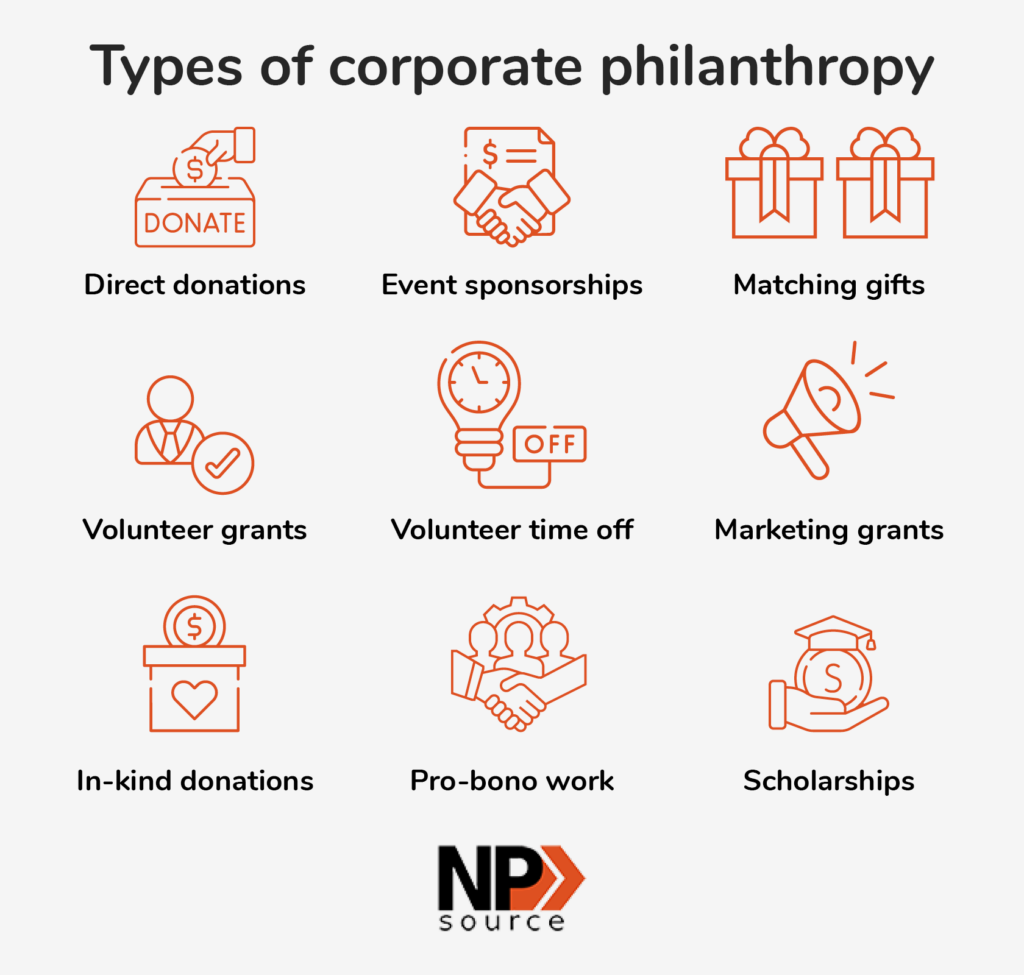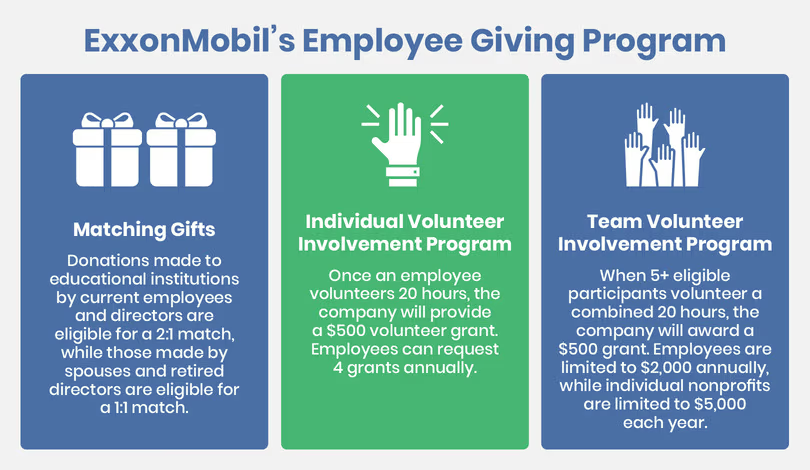Why Company Philanthropy Matters: A Guide to Company Social Responsibility
Corporate philanthropy works as an essential part of corporate social obligation. It mirrors a company's dedication to social concerns and enhances its public picture. Companies taking part in humanitarian initiatives commonly see improved employee morale and more powerful neighborhood connections. The real influence of these efforts can be intricate and multifaceted. Comprehending the nuances of company philanthropy can brighten its significance in today's service landscape. What are the critical factors that drive its success?
The Meaning of Corporate Philanthropy
Business philanthropy refers to the philanthropic payments and initiatives undertaken by businesses to support social reasons and area growth. This idea encompasses a variety of activities, including monetary contributions, staff member volunteer programs, and in-kind presents of services or products. Companies involve in philanthropy to address social issues such as education, healthcare, environmental sustainability, and destitution alleviation.
Generally, corporate philanthropy is structured via formal programs or collaborations with nonprofit companies, allowing organizations to leverage their resources efficiently. These initiatives usually intend to make a favorable effect on the community while lining up with the business's worths and objective. Furthermore, company philanthropy mirrors a dedication to business social duty, showcasing just how companies can contribute to culture past earnings generation. By joining humanitarian initiatives, companies can play a significant duty in cultivating social modification and addressing community requirements.
Benefits of Corporate Philanthropy for Companies
Involving in corporate philanthropy offers many advantages for businesses, enhancing their track record and fostering more powerful community connections. Companies that proactively participate in kind efforts often experience boosted employee morale and commitment. When workers view their company as socially responsible, they are much more likely to really feel happy with their workplace, leading to higher levels of work satisfaction and retention.
Additionally, company philanthropy can produce valuable networking possibilities. Collaborating with non-profits and area organizations permits services to connect with similar people and teams, possibly resulting in partnerships that can benefit both events. Additionally, services involved in philanthropy may find themselves extra attractive to financiers and stakeholders who focus on ethical practices.
Inevitably, business philanthropy not only sustains societal needs but likewise offers substantial benefits to businesses, producing a win-win circumstance that advertises growth and sustainability while adding positively to the world.
Enhancing Brand Loyalty Via Social Responsibility
Enhancing brand name loyalty with social obligation involves building trust fund with customers by aligning corporate activities with area values (corporate philanthropy). Firms can promote much deeper connections with area involvement initiatives that resonate with their target market. Furthermore, authentic brand narration can even more enhance commitment by showcasing real commitment to social reasons
Structure Count On Through Activity
Building count on via activity is an effective method that business can execute to enhance brand loyalty and foster much deeper links with customers. When organizations proactively participate in business philanthropy, they demonstrate a dedication to honest techniques and social responsibility. This positive technique not only boosts their reputation however additionally resonates with consumers who focus on worths placement. Openness in philanthropic initiatives is crucial; companies have to properly communicate their campaigns and the influence they are making. Authenticity plays a significant function as well; consumers are much more likely to sustain brands that really appreciate social concerns rather than those that engage in superficial advertising. Ultimately, by prioritizing significant actions over simple words, companies can nurture long-lasting count on and loyalty amongst their client base.
Area Engagement Campaigns

Authentic Brand Name Storytelling
Neighborhood interaction efforts often function as a foundation for authentic brand narration, which plays a significant role in cultivating brand commitment. By sharing genuine narratives regarding their social duty initiatives, firms can attach emotionally with customers. These stories highlight the brand's worths, mission, and dedication to societal renovation, promoting depend on and relatability. They are more likely to develop a deeper affinity and choice for it when consumers perceive a brand name as socially responsible - corporate philanthropy. Genuine narration also urges openness, welcoming consumers to engage with the brand on an individual degree. Because of this, companies not only boost their track record but likewise build lasting relationships with their audience, ultimately bring about boosted commitment and advocacy in an open market
The Duty of Workers in Business Philanthropy
Workers play a crucial duty in shaping a company's humanitarian efforts with their involvement and engagement. Effective worker interaction strategies can improve volunteerism, causing purposeful area influence. As organizations harness the cumulative energy and interest of their workforce, they can cultivate a culture of considering that prolongs past the work environment.
Worker Interaction Methods
Engagement in company philanthropy cultivates a sense of function that expands past mere profit-making. Business can enhance staff member involvement by applying numerous strategies that urge involvement in kind initiatives. One effective approach is to develop a matching gift program, where the firm matches employee contributions to qualified charities, intensifying their influence. Additionally, normal communication regarding kind initiatives can develop recognition and influence workers to add their time and sources. Supplying systems for workers to share their philanthropic passions cultivates a sense of possession and neighborhood. Identifying and rewarding employees for their philanthropic payments can also reinforce a culture of giving, eventually causing a Go Here much more involved labor force lined up with the company's social duty goals.
Volunteerism and Neighborhood Influence
Business philanthropy thrives when people actively take part in volunteerism, directly influencing the neighborhoods they serve. Staff member involvement in volunteer efforts not just enhances company society here are the findings yet likewise promotes a sense of function and connection among personnel. Through volunteering, employees create vital skills, such as synergy and leadership, which can translate into enhanced work efficiency. In addition, when staff members unite for community creates, they reinforce their bond with the organization, boosting total spirits and commitment. Organizations that urge volunteerism typically see a favorable public photo, as neighborhood interaction mirrors their dedication to social duty. Ultimately, the collective effect of employee volunteer initiatives can transform communities, resolving pressing social issues while reinforcing corporate worths and mission.

Measuring the Effect of CSR Initiatives
As companies significantly spend in company social responsibility (CSR) initiatives, recognizing their influence becomes essential for examining efficiency and leading future initiatives. Determining the impact of CSR calls for a multifaceted method, integrating both qualitative and measurable metrics. Trick efficiency indicators (KPIs) such as neighborhood engagement levels, worker contentment, and ecological renovations supply useful insights right into the results of CSR programs. Studies and meetings with stakeholders can disclose the social modification generated by these efforts, while information evaluation assists track development against established objectives.
In addition, straightening CSR goals with company objectives improves accountability. Organizations can use structures such as the Worldwide Coverage Campaign or the UN Sustainable Development Goals to systematize their measurement processes. Inevitably, precise analysis of CSR initiatives not just shows a firm's commitment to social obligation yet also educates method adjustments to make best use of positive influence, promoting a society of sustainability and neighborhood involvement.
Ideal Practices for Applying Efficient CSR Strategies
Applying efficient CSR techniques calls for a clear understanding of an organization's worths and goals, guaranteeing alignment with stakeholder expectations. Effective business start by carrying out an extensive evaluation of their social, ecological, and economic impacts, permitting them to determine areas for renovation. Stakeholder involvement is essential; organizations should proactively include staff members, customers, and neighborhood participants in the advancement and execution of CSR initiatives.
Transparency is one more ideal method, as it promotes trust and responsibility. Companies ought to communicate their CSR purposes and progression openly, sharing both challenges and successes. Additionally, incorporating CSR into the core business method improves its impact, making it a fundamental component of operations as opposed to a second thought. Routine evaluation and adjustment of CSR efforts, educated by stakeholder additional info comments and changing societal demands, warranty significance and efficiency. By sticking to these practices, companies can create significant and sustainable CSR approaches that reverberate with their areas.
Frequently Asked Questions
How Can Little Businesses Take Part In Company Philanthropy?
Local business can participate in corporate philanthropy by giving away a percentage of revenues, funding regional events, partnering with nonprofits, using worker volunteer days, and taking part in community solution activities, cultivating a favorable effect and improving their brand name online reputation.
What Are Common Misconceptions Concerning Business Philanthropy?
Common misunderstandings about corporate philanthropy consist of the belief that it's entirely a marketing tool, that just large firms can get involved, which it lacks authentic influence. Many ignore the value little companies can add with purposeful engagement.
Just How Do Consumers Perceive Companies Taken Part In Philanthropy?
Consumers commonly see companies involved in philanthropy positively, associating such efforts with business obligation, moral actions, and community assistance. This assumption can improve brand name commitment, influence acquiring decisions, and enhance overall company reputation in the market.
Exist Tax Benefits for Companies Included in Philanthropy?
Businesses associated with philanthropy commonly appreciate various tax benefits, such as deductions for philanthropic payments. corporate philanthropy. These incentives can boost a company's financial standing while promoting a positive public picture with their neighborhood interaction efforts
Can Corporate Philanthropy Improve Worker Retention Rates?
Corporate philanthropy can improve worker retention rates by fostering a sense of objective and belonging among team. Engaged employees, lined up with firm values, are much more likely to continue to be pleased and fully commited within their duties.
Company philanthropy serves as a necessary element of company social responsibility. Company philanthropy refers to the charitable contributions and initiatives undertaken by organizations to support social reasons and community advancement. Furthermore, company philanthropy reflects a dedication to company social obligation, showcasing just how services can add to society past profit generation. Engaging in company philanthropy offers various benefits for businesses, enhancing their track record and promoting stronger neighborhood connections. Customers commonly view business engaged in philanthropy positively, associating such efforts with business duty, honest behavior, and community support.